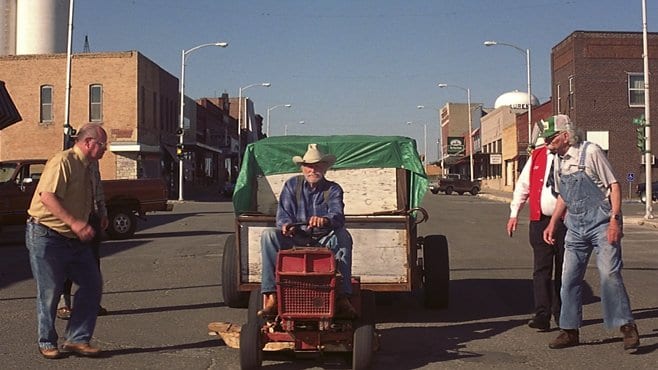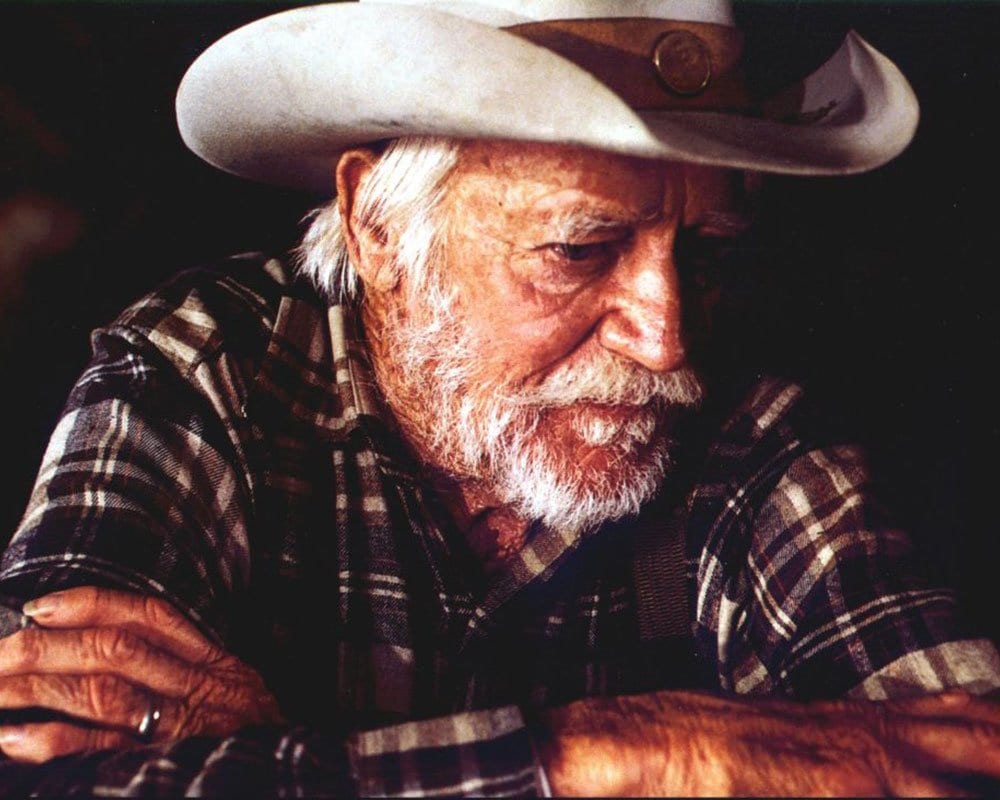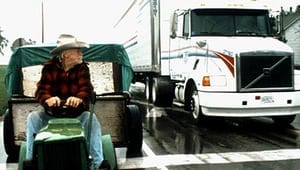I can remember so clearly how the first Lynch movie I ever watched affected me. I was in high school, and I didn’t know a thing about Lynch or what it meant to be Lynchian, nor did I have a big enough interest in movies to follow a certain director. Therefore, I didn’t know what to expect from a work of David Lynch. If I had, I would have never expected something as heartwarming and peaceful as The Straight Story.
I watched it with my mom and dad in the house that I had spent my whole life in. It wasn’t often for the three of us to all have the patience and desire to sit and enjoy the same movie at the same time. I can clearly remember the mood in the room—we were so quiet and still, and although we weren’t conversing it was one of the times that I felt closest to my parents. Afterwards, I went outside to the garden and watched my cats frolic and play while the sun set on a perfectly warm and pleasant evening. Butterflies danced in the air, squirrels chattered away in the trees—it was a perfectly Disney-esque scene for someone who never liked Disney. Even though I lived far from the wheat fields of Iowa in a sprawling suburb of San Francisco, I felt like I was out in the country—the heart of America that Woody Guthrie would sing about.

It was years later when I made the connection between Lynch, Lynch, and Lynch. It blew me away that my love affair with the dark and strange tales of Twin Peaks, Blue Velvet, and Mulholland Drive was made possible by the same person who directed The Straight Story. It didn’t make any sense that the man responsible for creating such a nightmarish quality in his work was also responsible for a rated-G Disney movie based on a true story that made me feel extra appreciative of family. And yet it made perfect sense. No one can capture beauty on screen the way Lynch can—he sees a unique beauty in the bucolic and forces the viewer to appreciate that beauty as he does. And no one can write slow-tempo music that can make you feel both hopeful and dreadful at the same time as perfectly as Angelo Badalamenti.
And, of course, no one else can get away with showing extended scenes of road lanes flashing by to an attentive audience.
So, what makes The Straight Story different from any other Lynch creation? Honestly, not much. The story is chronological. There is no nudity, swearing, rape, or on-screen corpses. Other than that, it has everything one would expect from Lynch. For one, Albert Straight and his friends have the pure humor and lovability of Senor Droolcup and Del Mibbler times ten. There are plenty of omi nous whooshing sounds to put you on the edge of your seat. And, although without horror, it has plenty of nightmares—Al’s post traumatic stress from what he went through in World War II is in some ways more terrifying than BOB himself. On top of that, you get to see Big Ed Hurley (I mean Everett McGill) for the last time before The Return, and dear old Carl Rodd (I mean Harry Dean Stanton) in a short but important role.
nous whooshing sounds to put you on the edge of your seat. And, although without horror, it has plenty of nightmares—Al’s post traumatic stress from what he went through in World War II is in some ways more terrifying than BOB himself. On top of that, you get to see Big Ed Hurley (I mean Everett McGill) for the last time before The Return, and dear old Carl Rodd (I mean Harry Dean Stanton) in a short but important role.
I have watched The Straight Story a number of times throughout the years. I always feel like I have to be in the right mood to watch it— even the weather has to be just so. So when I signed up to write about one of my most favorite, multi-watched Lynch films for 25 Years Later several months ago, I looked forward to that “perfect evening” to sit down and revisit The Straight Story. But that time didn’t come. I waited to feel calm and content, patient and at peace. And waited. And I realized that I was just going to have to watch it under not the most ideal circumstances.
So I watched the copy my dad gave me many years ago with my mom, my husband, and my son on Christmas Eve. My dad wasn’t there, as he had passed away a few weeks prior. Like Al, he was 73 years old. It was heartbreaking to watch it this time. I kept looking over to my dad’s chair that still sits in my parents living room, expecting to see his reactions to Al’s musings on life and death and old age. Wanting to laugh with him when Al’s daughter, Rose, mocked him about his bad hips. Wanting to tell him that I would drive for six weeks on a lawnmower if it meant that I could see him one last time.

Alvin Straight—the real Alvin Straight—was not a man who enjoyed the attention and celebrity that came with his epic lawn-mower adventure. He died about three years before The Straight Story was released, so it is impossible to know his thoughts on how his story was recreated for film. I, however, think that it was done perfectly. An everyday elderly man, living far from the hustle and bustle of any city, traveling at a grueling five-or-less miles per hour for six weeks—it is something so far from what we expect from the movies, at a pace far slower than we expect in society. It is the strongest reminder to slow down, take a deep breath, and stop to admire the sublimity of life to ever come out of Hollywood.



